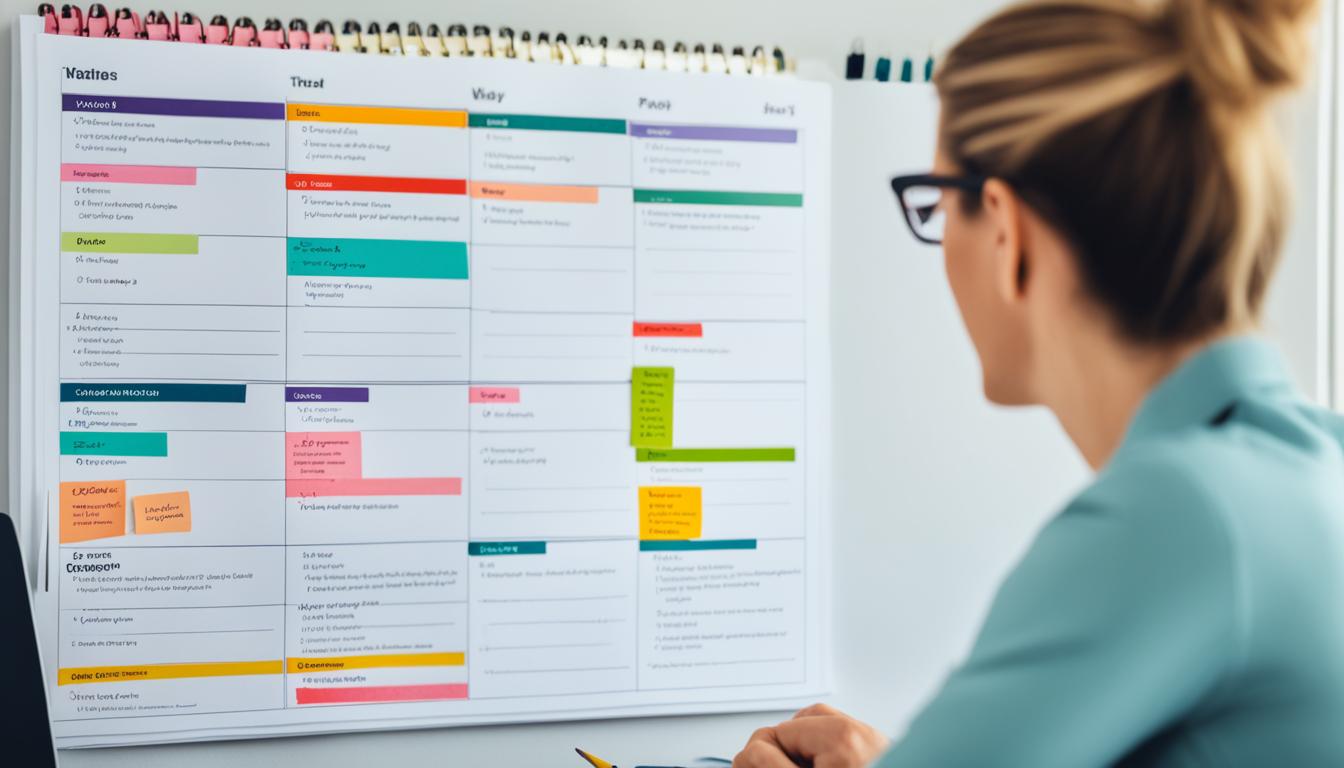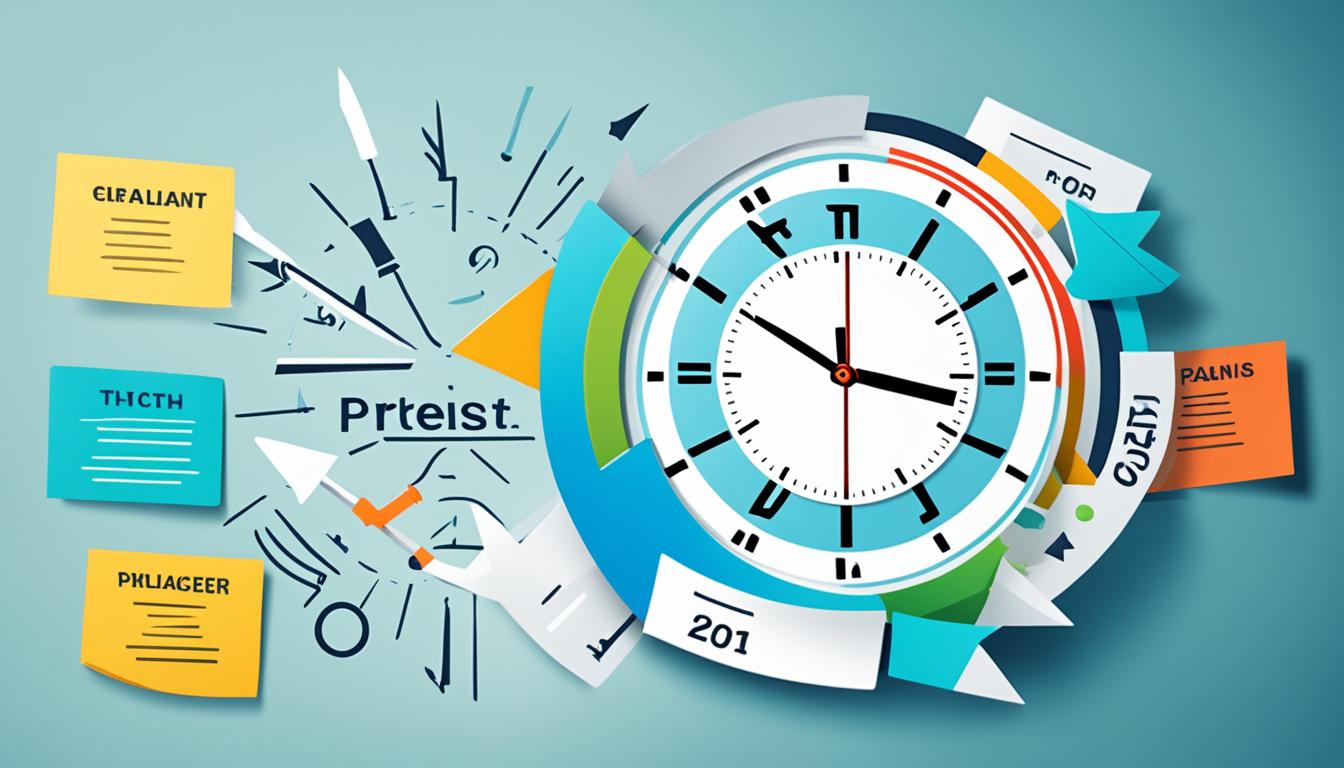In today’s fast-paced work world, planning your week is key. A Chief Intelligence Officer at Knightscope, Inc. found big benefits from weekly work planning. They say it’s vital for employee productivity and efficiency in many jobs.
Just 20-30 minutes a week for planning can help. It lets employees set goals, sort tasks, and get better at time management.

Using a calendar and to-do list helps employees plan their week. They can figure out how long tasks will take and plan their time. Start with easy tasks and move to harder ones based on what’s most important.
Good planning changes the game. It gives a clear purpose, helps make better decisions, and keeps up with many projects. It also keeps stress and distractions away.
Key Takeaways
- The average employee spends at least 3 hours in meetings every week.
- Time tracking can help identify and address productivity drains.
- Project management tools like Trello and Asana can enhance task efficiency.
- Google Calendar and Microsoft Outlook Calendar are useful for organizing tasks and deadlines.
- Scheduling tools like Calendly can improve time-blocking for meetings.
- Reflecting on past performances can help in prioritizing future tasks more effectively.
Introduction to Weekly Work Planning
Using a weekly agenda boosts career productivity. It helps organize tasks for a week. You can use it with paper or digital tools.
A structured task organization method helps set goals. It helps everyone, from new workers to top bosses. It brings order in a busy work life.
Weekly planning can increase productivity by helping individuals work more efficiently and get more done.
Weekly planning is key to managing your time well. The Plans, Progress, Problems (PPP) method tracks your work. It helps you see what you’ve done and what might slow you down.

Weekly planning also helps team goals with the Objectives and Key Results (OKR) method. It makes teams work better together. Sharing plans builds trust and teamwork in a company.
The Pareto Principle, or 80/20 rule, helps with weekly planning too. It means focusing on 20% of tasks for 80% of results. This makes work more efficient and productive.
Planning TechniqueBenefitsTools NeededPPP MethodologyTracks progress, identifies problems, and plans effectivelyNotebook, digital plannerOKR FrameworkAligns individual activities with team goalsAsana, Weekdone Team CompassPareto PrinciplePrioritizes tasks that yield significant resultsTask management apps
Adding a weekly agenda to your routine makes task management easier. It boosts career productivity. Planning and reviewing tasks brings clarity and balance to your work and life.
Increased Productivity through Planned Weeks
Planning your week can really help you work better and be more productive. Spending 20 to 30 minutes each week on planning helps everyone know what they need to do and when it’s due. This makes it easier to stay on track and get back to work quickly after a break.

Studies show that planning your schedule can make you 25% more productive. People who plan their weeks do 30% better at reaching their goals. This is because they have a clear plan to follow.
Organizations that plan their projects well are more likely to succeed. Tools like ClickUp help by tracking time and managing tasks. They give a clear view of what needs to be done and help share tasks well.
To work more efficiently, be realistic about what you can do in a week. Break big goals into smaller steps to keep things clear. Also, sort tasks by how urgent they are to save energy for the most important ones.
BenefitStatisticEnhanced Productivity25% increase for those who plan weeklyGoal Achievement30% more likely to achieve goalsLower Stress20% decrease in workplace stressMeeting Deadlines35% more likely to meet project deadlines
Improved Time Management Skills
Today’s work moves fast. Good time management is key. By using strategies to manage tasks better and cut down on distractions, workers can do more and feel less stressed. We’ll look at two key parts of managing time well: cutting down on distractions and planning tasks.
Minimizing Distractions
Distractions can really slow down work. Studies show workers get interrupted about 56 times a day. Planning your week helps by focusing on what’s most important. Tools like planners and apps can keep tasks in order and reduce distractions.

Also, keeping your workspace tidy helps focus. A clean desk makes you feel better and work better. By planning and organizing, workers can focus on what really matters, making work more efficient.
Effective Scheduling
Good scheduling is key to managing tasks well. It’s important to know what’s urgent and what’s important. The Time Management Matrix helps by sorting tasks into four areas.
- Quadrant I: Urgent and Important
- Quadrant II: Not Urgent but Important
- Quadrant III: Urgent but Not Important
- Quadrant IV: Not Urgent and Not Important
Planning time for work and personal life keeps a good balance. Working on hard tasks when you’re most productive helps you finish faster.
Using the Pomodoro Technique and Timeboxing can also help. These methods keep you focused and stop you from spending too much time on less important tasks.
Time Management StrategyDescriptionBenefitsPomodoro TechniqueWorking in 25-minute intervals with short breaks.Maintains focus and increases motivation.TimeboxingAllocating specific time periods for individual tasks.Increases productivity and ensures focus.Eisenhower MatrixPrioritizing tasks based on urgency and importance.Improves task management and prioritization.
These methods, as Dodd and Subdheim (2005) say, really help.
Benefits of Planning Your Week for Stress Reduction
Planning your week is key to lowering work stress and boosting well-being. By planning tasks, you can ease workload anxiety. This makes handling work easier and more confident.

Creating a Roadmap
Having a roadmap of tasks gives you a clear direction. This reduces workload anxiety. Studies show that planning helps manage time well and face daily challenges easily.
Erin Condren’s planners, like the LifePlanner™, are great for planning. They let you customize your schedule for a clear path.
- Helps in visualizing responsibilities
- Proactive identification of potential obstacles
- Promotes a sense of control and organization
Work-Life Balance
Weekly planning helps achieve a good work-life balance. It sets clear boundaries for work and personal time. This keeps personal time safe, lowers stress, and helps relax.
- Encourages mindfulness and reflective practices
- Aids in setting boundaries for personal time
- Fosters relaxation and mental well-being
Erin Condren’s Academic Planner is great for students. It helps log classes, assignments, and projects. This reduces stress and makes school life less overwhelming.
Planner TypeFeaturesBenefitsLifePlanner™Customization options, high-quality paperDetailed daily planning, improved time managementDaily LifePlanner™365 individual date pagesProgress tracking, alleviates daily workload anxietyMonthly PlannerAll-in-one organizer, calendar, notebookHelps in strategic task planning, improves organizationAcademic PlannerClass logs, assignments, project trackingReduces stress, aids in task prioritization
Using these tools and planning regularly helps manage your schedule better. It boosts productivity and leads to a more balanced life. Strategic planning makes work smoother and less stressful. This improves mental health and satisfaction.
Structured Decision Making
Planning on Sundays can make you more productive and manage your time well. It lets you look at your tasks and plan out your week. This way, you can focus on important tasks and give them enough time.
This method helps you make informed choices. It cuts down on last-minute decisions, which can be stressful. Planning helps you feel in control and sets realistic goals that match your big goals.

Managing your time well by setting aside specific times for tasks boosts productivity and lowers stress. Making a to-do list and getting your resources ready makes things smoother. Technology and tools help keep your planning tidy.
Adding self-care to your planning helps avoid burnout and keeps you well. A focused Sunday planning session helps you stay away from distractions. Being flexible lets you adjust if things change suddenly.
Planning on Sundays helps you avoid feeling swamped and keeps a good balance between work and life. Adding buffer time helps you handle surprises well. Focusing on tasks that matter to you makes your work meaningful and purposeful all week.
Enhanced Prioritization of Tasks
Weekly work planning helps a lot with task prioritization. It lets employees see which tasks need quick action. It’s key to spot urgent tasks and sort others to be done later or given to others.
A weekly plan makes sure employees focus on critical task focus areas. These are tasks that help reach long-term goals. Tools like the Eisenhower matrix or MoSCoW analysis help pick these tasks.
Companies like Walmart and Starbucks use this method. They value predictability, stability, and flexibility in work schedules. Planning ahead lowers stress and anxiety. This lets employees tackle tasks calmly and with confidence.
Using tools like Trello, Asana, Google Calendar, and Microsoft Outlook helps with prioritization. These tools help employees stay on track with important tasks. They also help avoid distractions.
Planning on Fridays helps prepare for the week ahead. Using Calendly for meeting-free times makes the week more organized. It’s important to set aside time to review past work and break big goals into smaller tasks.
Better prioritization boosts productivity and helps with professional growth. As people move up in their careers, they face more meetings. Tools like Tackle for tracking time help find and cut out time-wasting activities.
ToolPurposeBenefitTrelloProject ManagementStreamlines tasks and enhances productivityGoogle CalendarSchedulingHelps allocate time efficientlyCalendlyMeeting SchedulingDesignates meeting-free time slotsTackleTime TrackingIdentifies and eliminates time-wasting activities
Achieving Long-term Goals
Achieving long-term goals needs a good plan. This plan should focus on milestone setting and progress monitoring. Break big goals into smaller tasks to work towards them step by step. This makes managing daily tasks easier and keeps you moving towards your goals.

Breaking Down Larger Goals
Turning big goals into smaller tasks helps set clear milestones. Tools like the Eisenhower matrix and ABCDE method help pick the most important tasks. Time blocking also works well, setting aside specific times for goals each week.
This way, you focus on the 20% of tasks that give you 80% of results. Color coding tasks helps organize and prioritize them. Blocking time for admin tasks at the start and end of the day boosts productivity.
Having “do not disturb” time helps you stay focused on important tasks.
Tracking Progress
Progress monitoring keeps you motivated and on track for long-term goals. Regularly checking and adjusting your weekly plan helps you adapt to new situations. Celebrating small wins boosts your motivation and confidence.
Using paper planners, chosen by 28% of professionals, helps you reflect and improve your schedule. 76% of people find crossing off tasks in a planner more satisfying than digital methods. Planning on Sundays sets you up for a productive Monday and a focused week.
Being consistent and reviewing your past weeks helps you keep getting better. By using these methods, you can keep moving towards your long-term goals while handling both short and long tasks.
Regaining Control of Your Time
Effective time management is key for growing personally and professionally. It lets you control your schedule better. By planning your tasks for the week, you can take back your time. This also cuts down on meetings, so you can focus on what’s important.
Learning to delegate tasks is a big step in taking back your time. Knowing what tasks to give to others helps you focus on what’s most important. This way, you make sure your time is spent wisely.
Having a perfect weekly schedule helps you have more control over your time. It also lowers stress and stops burnout. People who plan their week early are 60% less likely to feel burnt out. They also see a 20% drop in stress.
Using good time management can even make you 25% more productive.
Sorting tasks and giving them to others helps you feel in control. This planning keeps a good balance between work, free time, and rest. It’s good for your mental health and happiness.
Tools for Effective Weekly Planning
In today’s fast-paced work life, the right tools boost your productivity and help organize tasks. Many productivity apps and task management software are out there. They help with planning your work life.
Time-tracking Apps
Apps like Timely are great for seeing how you spend your time. They show you where you can improve. This helps you use your time better.
Project Management Software
Software like Trello and Asana makes planning and tracking tasks easy. They break big projects into smaller tasks. This helps you move forward with your goals.
These tools also have features for working together and tracking progress. They keep everyone on the same page.
Calendar and Scheduling Tools
Tools like Google Calendar, Microsoft Outlook Calendar, and Calendly make planning easier. They combine meetings and tasks into one place. Features like time blocking help you focus on important tasks.
Using these tools can make you 20% better at finishing tasks. They’re key for good weekly planning.
With these apps and software, you can plan your week better. You’ll work towards your goals and keep a good balance in your work.
Tips for Developing a Weekly Work Plan
Creating a weekly work plan is key to being productive and managing time well. By using good planning and productivity tips, you can boost your work performance.
A work week is just five days long. It’s important to use your time well. Start by setting aside time for planning at the start or end of the week. Looking back at the last week helps you learn and do better.
Break big goals into smaller weekly tasks. This makes them easier and lets you track your progress better. It’s important to focus on the most important tasks and set deadlines to finish them.
Here’s a simple way to do it:
- Start by reviewing what happened last week.
- Set clear goals and priorities for this week.
- Turn big tasks into smaller, doable steps.
- Set specific times for each task, but be flexible.
- Add buffer times for surprises.
Use planning tips to make time for personal stuff too. Seeing meetings and deadlines on a timeline helps you get ready and stay organized. Tools like Gantt diagrams are great for this. They make it easy to see tasks and deadlines, which helps you work better productivity techniques.
Having a weekly work plan is good for your well-being. It helps you balance work and life. Sharing your plan with your team makes working together better and keeps everyone informed.
Being flexible with your schedule is important. You might need to change things because of new priorities or unexpected tasks. Being flexible helps you keep moving forward without getting too stressed.
Review and think about your plans often. This helps you get better at being productive and adapt to changes at work. More people now use digital tools because they are easy to use and change.
Creating a good weekly work plan is an ongoing task. By using these planning tips and tools, you can make your work week clearer and easier to manage.
StatisticBenefit84% of employeesManage time effectively with a weekly work plan62% of individualsReport increased productivity levels73% of employeesExperience reduced stress levels67% of employeesImprove work-life balance
Using both paper and digital tools, like Cozi, Trello, or Evernote, works well. For more info, check out insights on weekly planning.
Increased Focus and Motivation
Using a weekly work plan helps employees focus better and stay motivated. It makes it clear what needs to be done. This leads to better work and reaching goals.
Setting Clear Goals
It’s key to set clear goals to stay focused and motivated. Just 10 minutes of planning a day can save up to 2 hours. This planning helps employees focus on the most important tasks.
It also cuts down stress. Looking back at yesterday’s wins helps keep the momentum going. This creates a cycle of small wins and progress.
Maintaining Consistency
Sticking to a weekly plan helps keep goals in sight. Teams that plan well are 40% more likely to hit their long-term goals. It’s important to take breaks to reset our minds.
Using digital calendars helps manage time well. This lets employees finish tasks on time. Companies that use weekly plans see a 25% boost in productivity.
This helps workers stay healthy and grow in both work and life. Planning for flexibility is also key. It helps handle surprises and keeps work in line with big goals.
Conclusion
Weekly work planning has many benefits. It makes you more productive and helps you manage your time better. It ensures tasks are done at the right time, saving you time and reducing stress.
This approach helps you keep a balance between work and personal life. It stops you from feeling overwhelmed by too much to do.
Weekly planning helps you make better decisions and prioritize tasks. It makes sure your daily tasks help you reach your long-term goals. Tools like the Lio app make it easy to track your tasks and goals.
With a checklist, you can see your progress and focus on what’s important. This helps you stay on track all week.
Good planning also stops burnout by letting you take short breaks. It gives you control and room for surprises. Using consistent planning helps you stay focused, reduces distractions, and improves team communication.
In the end, planning your week is key to being happy at work and in life. It leads to a more relaxed and satisfying life.
FAQ
What are the benefits of planning your week as an employee?
Planning your week helps you work better and more efficiently. It makes you more productive and helps you manage your time well. This also lowers your stress levels.
What is weekly work planning?
Weekly work planning means making a plan for your tasks over a week. You set goals, sort tasks by importance, and use calendars and to-do lists to stay on track.
How does weekly planning increase productivity?
Weekly planning boosts productivity by giving you a clear view of what needs to be done and when. It helps you focus on the most important tasks. This makes it easier to reach your goals and complete tasks.
How can planning help with time management skills?
Planning improves time management by cutting down on distractions. It helps you manage tasks better and schedule them well. This makes your work more efficient.
How does weekly planning reduce stress?
Weekly planning lowers stress by giving you a clear plan of what to do. It helps you balance work and personal life better. Planning your tasks helps you feel less overwhelmed.
How does planning contribute to structured decision-making?
Planning helps you make better decisions by letting you assess tasks strategically. It makes it easier to use resources wisely.
Why is prioritizing tasks important?
Prioritizing tasks is key because it lets you focus on what’s most important for your job and company goals. This leads to better results at work.
How does weekly planning help in achieving long-term goals?
Weekly planning helps you reach big goals by breaking them down into smaller steps. You can track your progress and set milestones to stay on track.
How can employees regain control of their time?
Employees can take back control of their time by planning their tasks for the week. They can cut down on meetings and take charge of their schedule to focus on what’s urgent.
What tools are available for effective weekly planning?
There are many digital tools to help with weekly planning. Tools like time-tracking apps, project management software, and calendar tools make planning easier.
What are some tips for developing a weekly work plan?
To make a good weekly work plan, set aside time for planning. Think about what you’ve achieved before. Break big goals into smaller weekly tasks. Prioritize, set deadlines, and be flexible.
How does weekly planning increase focus and motivation?
Weekly planning boosts focus and motivation by setting clear goals. It keeps you consistent and helps you stay motivated by giving you a sense of progress and achievement.

More Posts
10 Best Objectives Key Result (OKR) Software for Entrepreneurs
Hello there, Entrepreneurs 🌟If you’re searching for the best OKR software to streamline your goal-setting, track progress, and get real-time updates on your organizational objectives, you’re in the right place. We’ve done the...
Best Goal Plan System to Track Progress and Setting Goals
Goal setting is essential to living a life with direction and purpose and achieving your business goals, whether it’s a particular goal or your ultimate goal, and a reliable goal plan system can...
12 Meditation and Productivity Techniques for a More Focused Mind
In today’s work world, staying focused helps us succeed. Being productive is important at work, especially during reviews. Learning to focus can really improve your work and make you more efficient. It’s key...
Top 10 Myths About Procrastination
Procrastination is often called "the art of doing nothing until it's too late." It affects how well we work and our happiness. Dr. Tim Pychyl, an expert on this topic, says not planning...